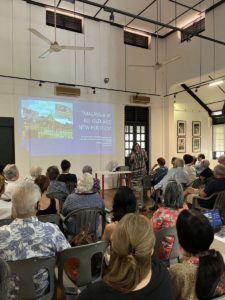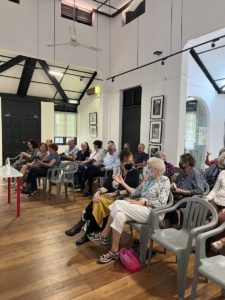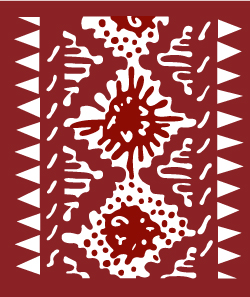

Wednesday 11th October 2023
MALAYSIA AT 60, OLD AND NEW POLITICS
Lecture by Dr Bridget Welsh at Badan Warisan Malaysia
We had the rare opportunity of listening to an outstanding talk by Dr Bridget Welsh, the author of books, articles and reports on regional politics. A person standing totally outside the local political arena and yet being amazingly analytical and knowledgeable about its idiosyncrasies. The speaker is currently an Honorary Research Associate with the University of Nottingham Research Institute Malaysia. She challenged the audience to react to her views which we did with many having questions and sharing opinions at the end of the lecture.
This is but a humble account of this momentous morning.
At 60, Malaysia seems to be held back by its past with no apparent fundamental shift. Little is changing in nation building, leadership, electoral politics where polarisation is more and more apparent. The cult of the personality mindset, fundamentalism and corruption are as resilient as ever. With one former Prime Minister’s mind still set in the 1960s and another one’s in the 1970s, one feels that the youths are not given the chance they deserve.
Malaysia seems to juggle endlessly with the old and new concepts of “Malaysian”. Is it One Malaysia, Malay Malaysia, Islamist Malaysia, not to forget the redistribution of power in Sabah/Sarawak. Today’s society is unequal, marginalised with racism everywhere. Deeply embedded and resilient, the sources of these divisions are:
- Religion growing marginalisation
- Royalty traditionally symbolic yet there exists an anti-royal sentiment
- Regions rural/urban divide and also Borneo separatism
- Rule of law corruption to get into power
with the underlying question of whether the people should have more rights, hence more power.
We are witnessing an uncertain landscape in electoral politics with major shifts in all parties. From a one-party dominant coalition in the past to today’s competitive coalitions which are deeply polarised. And the youths have no voice. It all leads inevitably to electoral volatility. It also heralds the end of reform driven politics and may bring about greater uncertainty.
However, as the last slide showed, the country still has many facets and will go on surprising us. The table revealed the BN ethnicity table with Chinese voters being dominant, followed by Indian voters and Malay voters forming the minority.
At 60, Malaysia remains a country of contrasts well reflected in its political landscape. Let’s hope that the present government will eventually bring more stability and be steadfast and affirmative in serving the interests of all its citizens.
Colette Hassan
